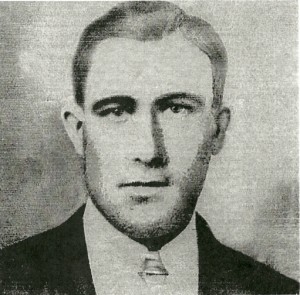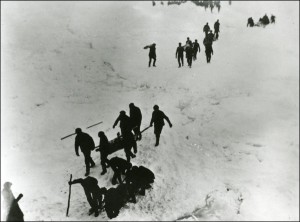This story is submitted by Courtney (Waye) George
March 10th, 1889-June 5th, 1967
The Sole Survivor of the Newfoundland Sealing Disaster from Little Catalina, Trinity Bay
_________________________________________________________________________
 When I was a little girl, I would listen to my grandfather’s stories, probably more attentively than he realized. I believed that my grandfather had the answers to all the world’s questions and so, I held on tightly to his words. Throughout my life, I heard many stories based in the tiny roads of his community, stories of family laughter and of joyous times and like many grandchildren, I adored each and every one of those stories, for it gave me a glance into my grandfather’s childhood. However, there came a time when one story was not full of laughter or joyous times, instead it was a story of resilience, strength and determination. At a young age it could have been seen as a daunting story, but instead, it captivated me. My grandfather explained the events in simple terms, so I as a child would understand and the point was made, my grandfather’s father, Jacob S. Dalton was a survivor. A survivor, those words were spoken so proudly from the mouth of my grandfather, the youngest child of the Dalton family. I always felt such pride to be related to a survivor. I knew little of what Jacob had to endure in order to survive, but in my eyes, he was a superhero, on top of the list right next to Superman. Although I was given such vague information when I was young, I continuously returned to this family story for years, thirsty to learn more, to envision the circumstances and to educate not only myself, but others on the matter. This year, 2014, marks the 100th anniversary of the Newfoundland Sealing Disaster and this year, is the year when I declare, to leave my Great Grandfather’s legacy alone.
When I was a little girl, I would listen to my grandfather’s stories, probably more attentively than he realized. I believed that my grandfather had the answers to all the world’s questions and so, I held on tightly to his words. Throughout my life, I heard many stories based in the tiny roads of his community, stories of family laughter and of joyous times and like many grandchildren, I adored each and every one of those stories, for it gave me a glance into my grandfather’s childhood. However, there came a time when one story was not full of laughter or joyous times, instead it was a story of resilience, strength and determination. At a young age it could have been seen as a daunting story, but instead, it captivated me. My grandfather explained the events in simple terms, so I as a child would understand and the point was made, my grandfather’s father, Jacob S. Dalton was a survivor. A survivor, those words were spoken so proudly from the mouth of my grandfather, the youngest child of the Dalton family. I always felt such pride to be related to a survivor. I knew little of what Jacob had to endure in order to survive, but in my eyes, he was a superhero, on top of the list right next to Superman. Although I was given such vague information when I was young, I continuously returned to this family story for years, thirsty to learn more, to envision the circumstances and to educate not only myself, but others on the matter. This year, 2014, marks the 100th anniversary of the Newfoundland Sealing Disaster and this year, is the year when I declare, to leave my Great Grandfather’s legacy alone.
This legacy, a legacy of bravery, of self-determination and of survival began in the small town of Little Catalina located on the tip of the Bonavista Peninsula, in Trinity Bay. Jacob S. Dalton was the surviving twin born to Philip and Maria Dalton on March 10th, 1889. He grew up with his brothers and sisters, helping in the traditional daily routines of rural Newfoundland life, surrounded by familiar families of friendly faces. Life in rural Newfoundland was not easy; the foundation of this province was built on the strong backs of its resilient people. For years the livelihood of Little Catalina’s inhabitants depended on the water and in the winter time, this proved no different. Every year, around the first week of March, there would be an influx of men from the out port communities fighting to get a berth on one of the icebound sealing boats in St. John’s. In 1914, my Great Grandfather and 6 other brave men from Little Catalina began their journey out to the ice; unbeknownst to them all that just shy of one month later, only one of them would return, not in a coffin. One of those men who would be not as fortunate as my Great-Grandfather was Theophilus Chaulk Jr. Theophilus was the 17 year old brother of Delilah Chaulk, Jacob S. Dalton’s future wife. And so, although I speak of the survival of my Great-Grandfather with such pride, my family, like many others had endured the pain of death due to the hardships of the ice.
 The Newfoundland Sealing Disaster was quite frankly, a series of unfortunate events, events that I will neither agree with nor dispute in this article. What is known and hard to dispute is the fact that from March 31st to April 2nd, 1914, 132 sealers were left on the middle of the ice pans, to defend themselves against Mother Nature’s cruel ways. With little to no protection and plummeting temperatures, survival would prove to be difficult. Throughout these days, my Great-Grandfather continuously fought the blizzard like conditions by constantly moving his arms to keep his circulation flowing. He was told time and time again that he was a fool and would be dead by morning. Many assumed he was wasting his energy and would eventually exhaust himself, but he proved them wrong. Although fully clothed, the sealers were certainly not dressed in winter jackets that can compare to the warmth of modern day clothing. The harsh winds, freezing temperatures and the dangerous environment took the lives of 77 healthy, hearty men. They were fathers and sons, they were brothers and nephews. They were loved ones and they were brave and determined. They were not barbarians. They were not savages. They were people, who, for the sake of their families pushed their bodies to the limits and endured surroundings of unbelievable circumstances. This was not a game for them. This was not pleasure. This was life in Newfoundland. These were men, who, when times were tough and they had children and wives to feed, they had no other choice, but to go to the ice and meet the possible perils that await them.
The Newfoundland Sealing Disaster was quite frankly, a series of unfortunate events, events that I will neither agree with nor dispute in this article. What is known and hard to dispute is the fact that from March 31st to April 2nd, 1914, 132 sealers were left on the middle of the ice pans, to defend themselves against Mother Nature’s cruel ways. With little to no protection and plummeting temperatures, survival would prove to be difficult. Throughout these days, my Great-Grandfather continuously fought the blizzard like conditions by constantly moving his arms to keep his circulation flowing. He was told time and time again that he was a fool and would be dead by morning. Many assumed he was wasting his energy and would eventually exhaust himself, but he proved them wrong. Although fully clothed, the sealers were certainly not dressed in winter jackets that can compare to the warmth of modern day clothing. The harsh winds, freezing temperatures and the dangerous environment took the lives of 77 healthy, hearty men. They were fathers and sons, they were brothers and nephews. They were loved ones and they were brave and determined. They were not barbarians. They were not savages. They were people, who, for the sake of their families pushed their bodies to the limits and endured surroundings of unbelievable circumstances. This was not a game for them. This was not pleasure. This was life in Newfoundland. These were men, who, when times were tough and they had children and wives to feed, they had no other choice, but to go to the ice and meet the possible perils that await them.
I believe that every individual has a right to express his or her opinions. I will never argue that fact, but I will argue ignorant judgments. Time and time again, I have watched videos of celebrities and people who believe that they have the status that allows them to expel words and sentences out of their mouths without an educated filter. To write this and not express my emotions would prove to be difficult. For years, I was related to a survivor and now, individuals that know nothing of my family, nothing of my culture and nothing of my people have decided to inform me, that I am the Great Granddaughter of a savage, a barbarian. These statements do anger me, but for the most part, these statements hurt me. I understand that all organizations have facts and figures that influence the data to prove their arguments, but while they do this, they tarnish the legacy of the men that have sacrificed their lives to feed and provide for their families. I understand the organizations whose arguments are against the annual seal. I understand the arguments because I have chosen to read the facts and figures presented by them; I can only wish that these organizations would do the same for facts and figures that are for the hunt, that is, before passing their judgments. I realize that a lot of the attention these days is targeting modern day sealing; but do these sealers not deserve to provide for their families, has the people of Newfoundland has done for hundreds of years? Do they not deserve a livelihood? There are many statements that I would like to dispel about the sealers and the annual seal hunt, but this is neither the time nor the place. Instead, I will choose to praise the men who walked the ice pans of Newfoundland and Labrador, past and present. Instead, I will choose to embrace my family’s history and to spread the word of my Great- Grandfather’s survival. I will choose to proclaim him a survivor and not a barbarian. And I will choose to not judge those whose views differ from mine, simply because I do not wish to stoop to those levels. As H. Jackson Brown Jr. once said, “let the refining and improving of your own life keep you so busy that you have little time to criticize others.”
I will remember my grandfather’s story for the rest of my life. His words will be repeated for years to come and generations after me will know of Jacob S. Dalton, the survivor. I mean no disrespect, but I do urge others to respect. May their legacies live on, may their stories be heard.
____________
CBC has a video of a church service in memory of lives lost that tragic day and some background on the story here:
54 Hours NFB film item is here
